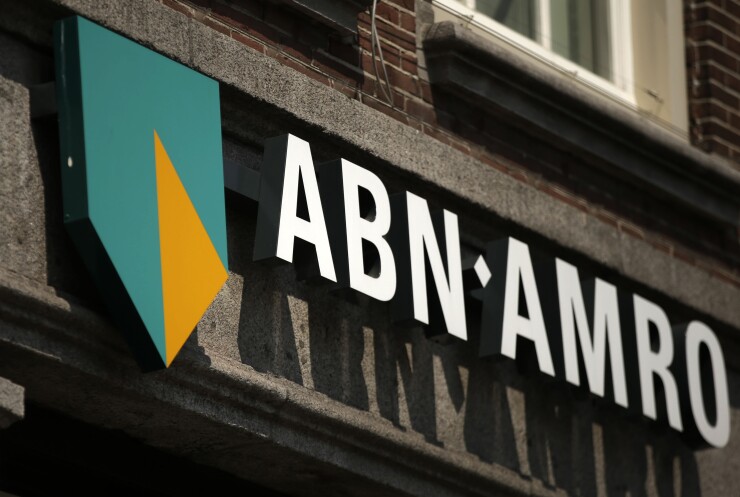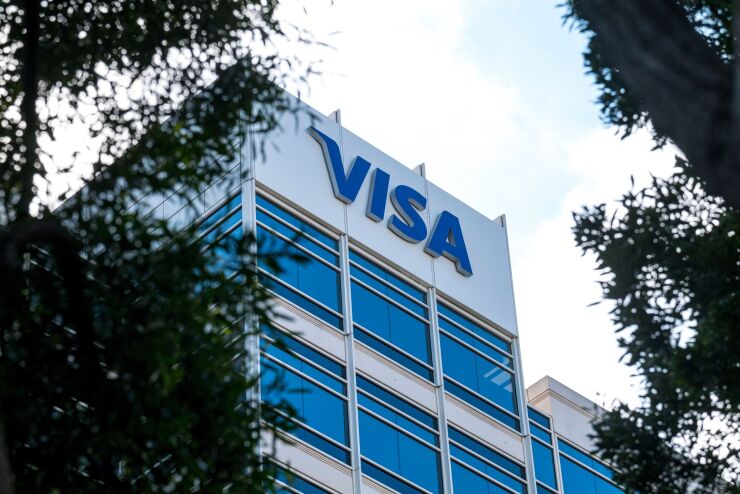The European Payments Initiative, a bank-backed venture designed to compete against Visa and Mastercard, completed its first e-commerce transaction late last year ahead of a wider rollout that’s expected later in 2025.
The proof-of-concept account-to-account transaction was completed between the end of November and mid-December using digital wallet Wero on the online store of German football club FC Kaiserslautern. VR Payments, a subsidiary of DZ Bank, acted as the merchant acquirer.
Additional trials will be conducted over the first half of 2025, with an expected official launch in Germany this summer. A Belgian launch will follow in the fall, and rollout will begin in France at the beginning of 2026.
Further trials will be conducted throughout the first half of the year before the launch in Germany.
“Wero will allow consumers to pay at e-commerce merchants directly with their bank account, without any intermediary or additional payment means,” according to an EPI release. “The e-commerce solution will cover standard payment use cases such as one-off payments and refunds and will add more complex payment models over time.” —Joey Pizzolato
 ABN Amro’s mobile payments app is flush with success
ABN Amro’s mobile payments app is flush with success
A lack of public toilets in the Netherlands helped payments app Tikkie to process $7.7 billion via 157 million payment requests in 2024, a record for the ABN Amro unit. Tikkie, ABN Amro’s payments app, processed a record $7.7 billion in 2024, totaling 157 million payment requests. The numbers were boosted in part by the lack of public facilities in the Netherlands. The app, which was launched in 2016, is free to anyone with a Dutch bank account and enables users to send payment requests using WhatsApp, Messenger, SMS text, a QR code and other digital options.
The primary use for the requests, called Tikkies, was to split payments for dinners, groceries and lunches. But the bank said more than 1 million requests in 2024 were less than 1 euro, primarily to pay to use toilets.
The Netherlands almost universally requires people to pay to use the bathroom outside of their homes. This includes funding to pay staff and to support the enabling technology. The fees are generally around 1 euro for restrooms in train stations, bus stations and public parks. Most restaurants also charge people to use the bathroom. There are a small number of free public toilets in large cities such as Amsterdam.
There’s a large boost in payments during King’s Day, a national holiday that celebrates the Dutch monarchy, with the bank specifically mentioning restrooms as a major use case for the payment app, the bank reported in a release.
The ABN Amro app also gets a boost through another old-school method, refunding payments for people who return recyclable beverage bottles.
“A million people have already received direct refunds on their bottle deposits via Tikkie,” said Moreno Kensmil, head of marketing for Tikkie, in a release. “As more places around the Netherlands have deposit return machines with Tikkie QR codes, including at schools and railway stations, near fast-food outlets and in garden centres, this makes it easier for people to return their reusable containers and get their money back quickly, while at the same time helping to keep the world around them clean.” —John Adams

David Paul Morris/Bloomberg
Visa partners with UAE-based spend management platform
Visa is partnering with United Arab Emirates-based spend management platform Qashio to launch a business-to-business travel payments program called Visa Commercial Choice Travel, according to a release posted to Zawya.
The program will allow travel companies to obtain Qashio cards and transact in different currencies, such as the United Arab Emirates dirham, the Saudi riyal, the U.S. dollar, the euro and British pound sterling. Travel companies will be able to digitize and automate travel payments.
Visa and Qashio will invest 100 million United Arab Emirates dirham ($27.2 million) in the coming years to offer services in the UAE, the Middle East, North Africa, Europe and the United Kingdom, according to the release.
“We recognise that the travel and tourism industry is key in the region. However, the travel companies are underserved with strong technical payment solutions that work in their favor. We are creating a one-stop platform that simplifies the corporate travel experience for our clients, allowing them to focus on what truly matters — growing their businesses,” said Armin Moradi, CEO and co-founder of Qashio, in a statement. —Joey Pizzolato

Bloomberg Creative Photos/Bloomberg
Paysafe bets on Brazilian gaming market
Brazil’s central bank has given Paysafe a payments institution license in anticipation of the country’s online sports-betting market, which is expected to be the largest in Latin America when it’s launched later this year.
The London-based digital payments company will be able to expand partnerships with digital gaming companies and will also enable Paysafe to sell nongaming payment processing to merchants and e-commerce sellers in Brazil.
Paysafe launched an account-to-account payments option for digital gaming systems in April, enhancing an existing digital gambling payments business that is live in more than 90 countries.
“With this expansion, Paysafe is poised to better serve the Brazilian market with payment solutions, including the regulated Brazilian iGaming market, which will mark a new era for not only Latin American gaming but also the global space, with the country becoming the third largest betting jurisdiction on earth,” said Rob Gatto, chief revenue Officer at Paysafe.
Supporting gambling payments has become a large market for banks and payment companies in recent years as more countries and U.S. states legalize forms of gaming such as sports betting.
But that growth has also come with risk, as gambling addictions have caused some consumers to accumulate debt, causing credit challenges for banks. —John Adams
 Verifone, FreedomPay team to cross-sell payment tech
Verifone, FreedomPay team to cross-sell payment tech
Verifone and FreedomPay have integrated their technology ecosystems, combining Verifone’s roster of merchant-focused products with FreedomPay’s payment orchestration platform.
Payments orchestration routes transitions through the best available option based on cost, processing time and user experience. More merchants are seeking payments orchestration as payments become more complicated, with a mix of digital channels and processing options such as the RTP network and FedNow.
In an earlier interview, Gabriel Grisham, senior vice president of fintech PayQuicker, said payments orchestration would lay the foundation for using advanced artificial intelligence to analyze payment partners, predict preferences and streamline transactions in a way that makes shopping and checkout more personalized.
Verifone, along with rivals such as Diebold Nixdorf and NCR, in recent years has expanded beyond traditional point of sale hardware to counter an expanding market of fintechs that have attracted merchants. By teaming with FreedomPay, Verifone can address that pressure while reducing the need to build the added technology in-house.
Integrating Verifone’s full line of payment devices allows FreedomPay to provide its merchants with greater flexibility and the latest in payment technology, said Tom Durovsik, founder & CEO of FreedomPay, in a release. —John Adams ‘
 Uruguay-based payments provider considers sale
Uruguay-based payments provider considers sale
Uruguay-based payments provider DLocal is mulling a potential sale, Reuters reported this week, citing unnamed sources. The company trades on the Nasdaq and has a market value of about $3.4 billion.
The Latin American company has solicited Morgan Stanley to gauge interest from buyers, which potentially include private-equity firms and large fintechs. The move marks the company’s second attempt at a sale, Reuters said, following an attempted sale in 2024 that fell apart when the parties could not agree on financial terms.
DLocal processed $17.7 billion worth of payments in 2023. It has more than 800 team members and works with over 600 merchants across more than 40 countries, according to its website. —Joey Pizzolato
 Nordic software provider completes verification of Payee
Nordic software provider completes verification of Payee
Finnish banking-as-a-service provider Tietoevry Banking has partnered with a Swedish payments fintech to offer confirmation of payee services to banks and financial institutions in the European Union.
Confirmation of Payee is a security feature that checks the name of the recipient of a payment with the sender to ensure that the payment is going to the intended recipient. CoP implementation has been mandated in the single European payments region by October 2025, following Thursday’s deadline that banks in the EU accept receipt of instant payments.
CoP has gained momentum in tandem with instant payments, which are hard, if not impossible, to reverse once sent.
“Instant Payments Regulations have presented some implementation challenges for banks, especially as they prepare for the arrival of the EU’s third payment services directive, expected before 2027,” said Anders Olofsson, head of sales for payments and cash management at Tietoevry Banking, in a statement. “The registration we are announcing today empowers us to manage requests to verify payer and payee identities on behalf of banks, as well as responses.” —Joey Pizzolato
Source link : http://www.bing.com/news/apiclick.aspx?ref=FexRss&aid=&tid=677fad9572cf4226860be53ab59e56f8&url=https%3A%2F%2Fwww.americanbanker.com%2Fpayments%2Fnews%2Feuropean-union-debuts-real-time-payments-mandate&c=2959921659264184147&mkt=en-us
Author :
Publish date : 2025-01-08 15:45:00
Copyright for syndicated content belongs to the linked Source.


